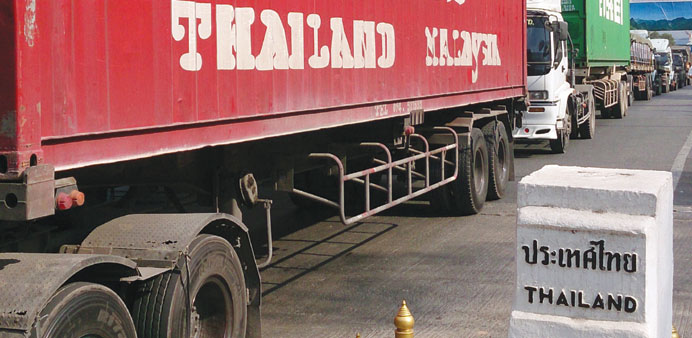About 55% of Thailand’s border trade goes through the southern Sadao border post. PICTURE: Arno Maierbrugger
By Arno Maierbrugger/Gulf-Times Correspondent/Bangkok
The Thai government is pushing economic development in the country’s Muslim-dominated southern provinces by establishing a Special Economic Zone in Songkhla province at the border to Malaysia to promote trade in the region affected by unrest and to stimulate the local economy ahead of the arrival of the Asean Economy Community at the end of 2015.
In addition to this, the government in Bangkok has approved $80mn to build a new border complex to process the 5mn people who cross the Thai-Malaysian border in Sadao per year and to cope with the expected 10 to 20% annual increase, Theera Wongratch, head of Sadao Immigration, told Gulf Times.
“Around 55% of Thailand’s entire border trade goes through this border post,” Wongratch said. “It connects to the northern Malaysian province of Kedah from where a rail connection leads further south to Malaysia and Singapore.”
According to latest customs statistics, around $15.3bn worth of goods were traded at this particular border last year, making it a strategic point along the North-South Economic corridor and the Indonesia-Malaysia-Thailand Growth Triangle in that area. Exports from Thailand are shipped not only to Malaysia, Singapore and Indonesia, but further to China, Japan, South Korea and the US.
One of the main products grown and processed in the Songkhla Special Economic Zone is natural rubber, in the form of both rubber sheets and latex. Plans are that the zone is to become a rubber-processing industrial estate for which national and international investors are sought.
Investment projects in the zone will be eligible for the Thai Board of Investment’s new investment promotional privileges, including the maximum eight-year corporate income tax exemption and a 50% reduction of corporate income tax for an extra five years after the corporate income tax exemption period expires. Investors can also enjoy other tax benefits, including a double deduction for transportation, electricity and water utility costs. The Thai government has committed to further infrastructure development in the region.
Southern Thailand with its 1.8mn Muslims and 300,000 Buddhist Thais is in need for economic stimulation as decades of insurgency and unrest in the four provinces in Songkhla, Pattani, Yala and Narathiwat have taken their toll on the region and deterred investors. Furthermore, in 2014, the economy in the south has been deeply affected by declining prices of agricultural goods and the lower number of tourists as a result of the political unrest in Thailand. Household income in the south is around 20 to 25% lower than the Thai average.
The military government in Thailand has thus introduced a “Southern Border Provinces Problem-Solving and Development Action Plan 2015 to 2017” to handle the situation and improve people’s lives in the region, Colonel Pramote Prom-In, spokesman of the Internal Security Operations Command of the Fourth Army Area Command, told Gulf Times.
Apart from setting up industrial estates, this also includes improvements in education and cultural development, for example an overseas student programme in cooperation with the University of Egypt and support for private Islamic schools, the Colonel said.
“The project aims at improving the living standard for the people from the grassroots to decrease the social gap. The government has a soft approach and is listening to all stakeholders,” he said, adding that “the situation has markedly improved in the last six months,” which, in turn, is essential to attract investors to the region.

